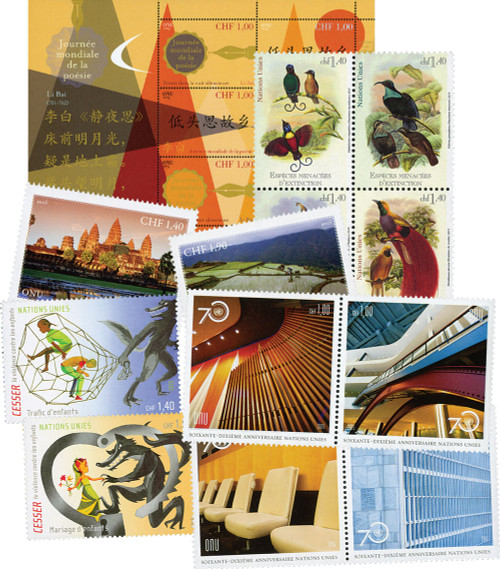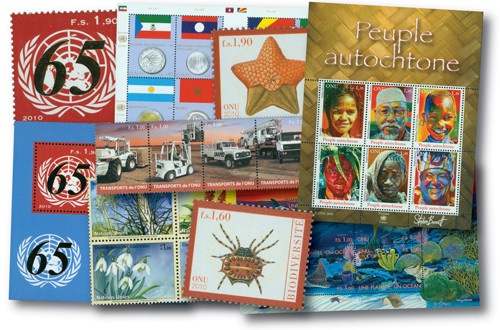
# UNGYS2001 - 2001 United Nations Geneva - Year set
Get the 2001 Geneva UN Year Set
With one easy order, get the 2001 Geneva UN Year Set. Stamp subjects include International Volunteers Year, Dag Hammarskjöld, Climate Change, the Nobel Peace Prize, and more. Save time and money over ordering individual stamps – get your 2001 Year Set today.
Set Includes:
UNG367-70
UNG371-72
UNG373-74
UNG376
UNG377-78
UNG379
UNG380-83
UNG384
The United Nations was formed in 1945 and franked official mail with U.S. postage. In 1948, a member of Argentina’s delegation to the U.N., Jose Arce, was elected president of the General Assembly. Arce was an avid stamp collector, and drafted a resolution that was instrumental in the creation of the U.N. Postal Administration and the issuance of the first U.N. postage stamps in 1951. Arce envisioned three primary purposes for U.N. stamps. First, he believed the ability of this international organization to issue authentic postage stamps, a privilege formerly reserved solely for sovereign states, would lend it authority. Second, he thought the stamp would be an excellent source of revenue. Third, Arce wanted the stamps to be ambassadors to the world – spreading the U.N.’s messages, philosophies, and missions. Several decades of U.N. philately have proven Arce’s vision to be correct.
The relationship between the United Nations and philately began well before the issue of the first U.N. postage stamp. Many commemorative covers were made for the founding conference of the United Nations in San Francisco in June 1945. In England, philatelists successfully lobbied the Royal Mail to use special slogan cancels to publicize the first meeting of the U.N. General Assembly. Collectors all over the world began saving mail sent from the U.N. franked with meters using the United Nation’s emblem.
However, no one could have anticipated just how strongly stamp collectors would come to support the U.N. As the U.N. reported, “Stamp collectors are the main counterparts of these roving messengers. Collectors are the people most attuned to seeing the messages in stamp designs. They play an essential role in giving them an extended life, an audience wider than the recipient of an individual letter. Collectors’ continued interest provides the audience for United Nations stamps, and for many commemorative stamps issued each year by national postal authorities publicizing the U.N.’s work.”
The Geneva branch of the United Nations Postal Administration was opened at the Palais des Nations on October 4, 1969. The Geneva headquarters issued stamps denominated in Swiss francs. Ten years later, the Vienna headquarters began issuing U.N. stamps denominated in Austrian schillings. Treaties between the agency and the three nations guarantee that the U.N. Post Office classes and postage correspond to those at any United States, Swiss, or Austrian post office. Each country’s postal agency also receives revenue from the sale of U.N. stamps to offset the cost of processing the mail.
Get the 2001 Geneva UN Year Set
With one easy order, get the 2001 Geneva UN Year Set. Stamp subjects include International Volunteers Year, Dag Hammarskjöld, Climate Change, the Nobel Peace Prize, and more. Save time and money over ordering individual stamps – get your 2001 Year Set today.
Set Includes:
UNG367-70
UNG371-72
UNG373-74
UNG376
UNG377-78
UNG379
UNG380-83
UNG384
The United Nations was formed in 1945 and franked official mail with U.S. postage. In 1948, a member of Argentina’s delegation to the U.N., Jose Arce, was elected president of the General Assembly. Arce was an avid stamp collector, and drafted a resolution that was instrumental in the creation of the U.N. Postal Administration and the issuance of the first U.N. postage stamps in 1951. Arce envisioned three primary purposes for U.N. stamps. First, he believed the ability of this international organization to issue authentic postage stamps, a privilege formerly reserved solely for sovereign states, would lend it authority. Second, he thought the stamp would be an excellent source of revenue. Third, Arce wanted the stamps to be ambassadors to the world – spreading the U.N.’s messages, philosophies, and missions. Several decades of U.N. philately have proven Arce’s vision to be correct.
The relationship between the United Nations and philately began well before the issue of the first U.N. postage stamp. Many commemorative covers were made for the founding conference of the United Nations in San Francisco in June 1945. In England, philatelists successfully lobbied the Royal Mail to use special slogan cancels to publicize the first meeting of the U.N. General Assembly. Collectors all over the world began saving mail sent from the U.N. franked with meters using the United Nation’s emblem.
However, no one could have anticipated just how strongly stamp collectors would come to support the U.N. As the U.N. reported, “Stamp collectors are the main counterparts of these roving messengers. Collectors are the people most attuned to seeing the messages in stamp designs. They play an essential role in giving them an extended life, an audience wider than the recipient of an individual letter. Collectors’ continued interest provides the audience for United Nations stamps, and for many commemorative stamps issued each year by national postal authorities publicizing the U.N.’s work.”
The Geneva branch of the United Nations Postal Administration was opened at the Palais des Nations on October 4, 1969. The Geneva headquarters issued stamps denominated in Swiss francs. Ten years later, the Vienna headquarters began issuing U.N. stamps denominated in Austrian schillings. Treaties between the agency and the three nations guarantee that the U.N. Post Office classes and postage correspond to those at any United States, Swiss, or Austrian post office. Each country’s postal agency also receives revenue from the sale of U.N. stamps to offset the cost of processing the mail.











